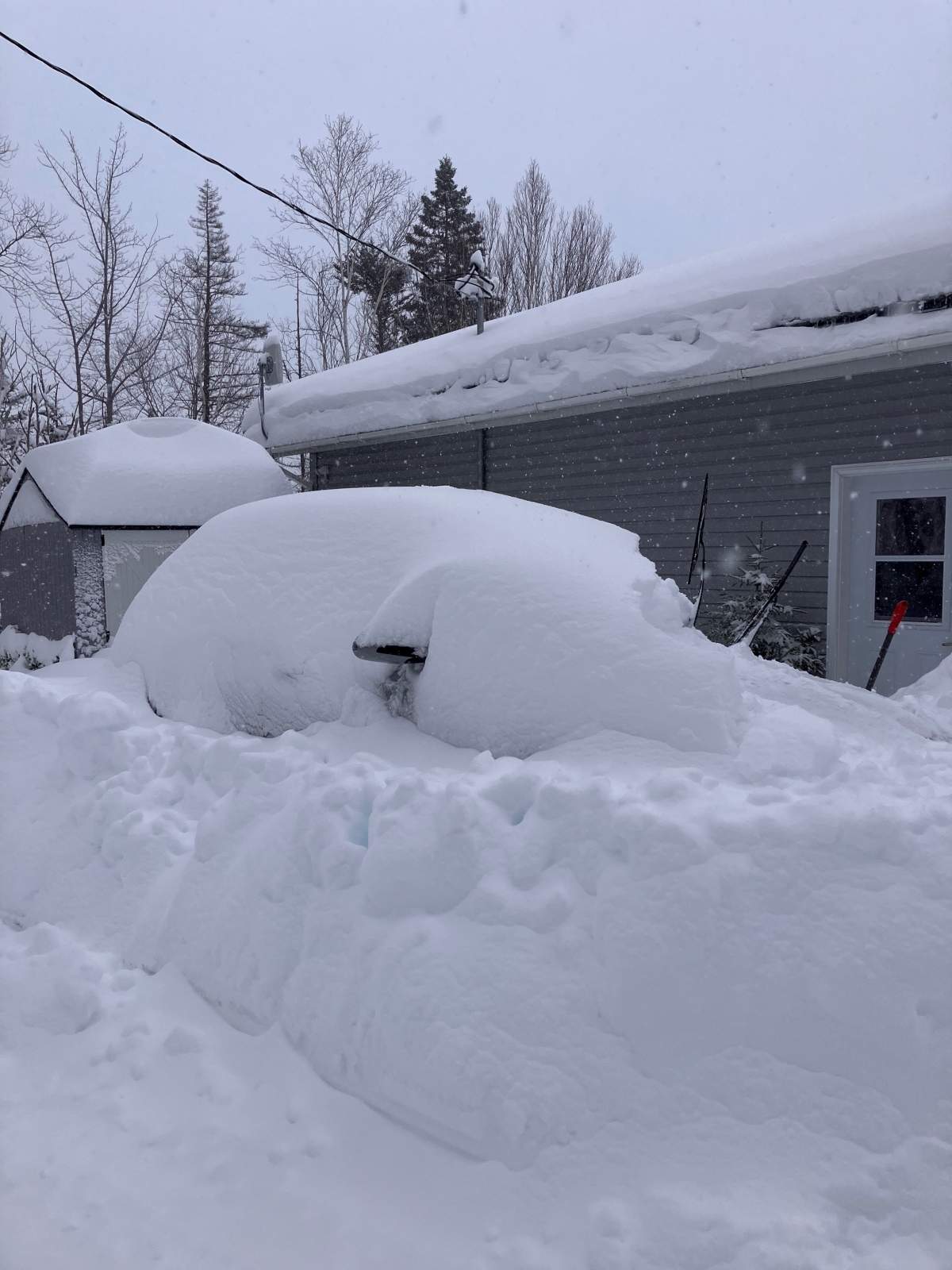A relentless, multi-day snowstorm that dumped more than 100 cm of snow in parts of Nova Scotia has people in Cape Breton sitting and waiting to be dug out.

Pam Leader of Glace Bay anticipates she’ll still be hunkering down in her home three days from now. That’s not just because there’s nothing open and nowhere to go — she also can’t physically open her door.
“The front door is blocked. The windows, in the back, there’s seven feet of snow,” she said.
“Last night, I did have somebody come and shovel just a pathway out, and this morning, that pathway is gone.”
Leader admits she felt panicked Sunday when she thought about the ‘what ifs’ and being trapped in the home.
“I just have to stay positive, and, there’s nothing going to happen because there are people in worse shape than me, that probably cannot get out as well,” she said.
“The snow is so high, it’s going to need a different (machine), a plow isn’t going to do it. So unless I have someone that’s going to shovel a little tunnel … then that’s probably the only way at this point.”
An hour away on the island in Sydney, Donald Campbell is in a similar situation. He estimates there’s more than 3.5 metres of snow outside the family home and no way to get out of his driveway.
He described their situation as a “standstill” as they wait to be plowed out.

Get daily National news
“The worst part for us, is playing with the snow fort, we broke two of our shovels,” he explained, with a laugh. “So now there’s nothing opened … we’re really stuck here now.”
While his family feels safe for the time being, he is concerned about their elderly neighbours.
“We’ll come together as Cape Bretoners and we’ll get through it. It’s just going to be a little tougher than what we’re used to,” said Campbell.
Local state of emergency
Between Friday and Monday, more than 100 cm of snow fell at the Sydney airport, and a volunteer weather observer measured 150 cm in Sydney, according to Environment Canada’s weather summary.
The snowfall — one of the heaviest in the last 20 years — prompted the Cape Breton Regional Municipality to declare a local state of emergency.
Cape Breton Mayor Amanda McDougall said Monday that there’s been some misinformation about what the state of emergency means. The measure gives government additional powers, but she stressed that it does not ban businesses from opening, for example.
However, McDougall is reminding residents not to venture out unless it’s for an essential service, medical appointment or an emergency.
“We are limiting travel if it is nonessential. If you just need to get a Tim’s, I’m sorry, stay in the driveway. Now is not the time,” she said.
“No lollygagging, no taking pictures. Get to the end of your driveway and that’s it.”
The state of emergency is in place for seven days and can be renewed if necessary. McDougall said the plows the municipality has can’t even handle the amount of snow they’ve received, and they need larger machinery for the “slow grind” of clearing the roadways.
“As best as the province can right now, they’re deploying snow removal materials and machinery. Now that’s troublesome because we’re not the only community that’s struggling with snow right now,” she said.
“So reallocating resources is a little tricky. It’s kind of a wait and see game until everybody else is cleared out.”
During a news conference Monday afternoon, Premier Tim Houston raised doubts about the local state of emergency.
“It’s not required to access resources or assistance,” he said.
“They can absolutely do that, they don’t need provincial approval to do that, we respect their ability to do that, but at the end of the process I kind of wonder what they’ll do with it.
He later said that officials have a responsibility to do their best to “calm fears and anxiety and not stoke it” and reiterated the province was doing everything it could to get everything cleared up.
Meanwhile, McDougall said she heard directly from federal Emergency Preparedness Minister Harjit Sajjan, who confirmed that the municipality and province’s request for assistance had been escalated up to the federal level.

She stressed her concern right now is how residents are going to be able to physically and financially tackle snow removal.
“People with physical disabilities and exceptionality, they worry me because I know that the removal of snow is … so much harder for them,” she said.
“There’s also the financial aspect, too. So not everybody in our community has the ability to just call up a backhoe and say, ‘I need you to come here. I’m going to throw some money at this and get it cleared.’ It’s it’s not the reality for many people.”
— with files from Global News’ Heidi Petracek, Skye Bryden-Blom and Alex Cooke










Comments
Want to discuss? Please read our Commenting Policy first.